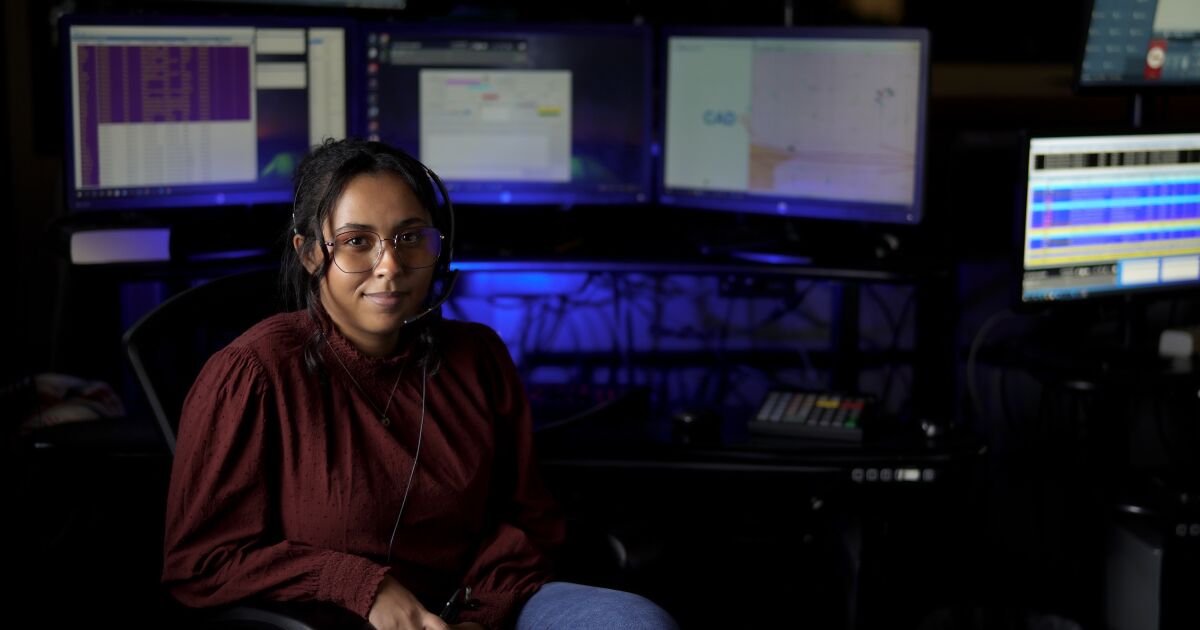Perkins has been a fire dispatcher with the San Diego Fire Department for over three years. She lives in San Diego.
Mental health is a complex subject in itself. Add to that fast-paced, high-stress, urgency-based work and you’ll turn this complex topic into a tangle of thoughts and emotions. This web is where most 911 dispatchers live, but luckily where there is chaos there is order, and I would say most of us have found that order. There’s no right or wrong way to find inner peace when we listen to the horrors of strangers’ lives almost every day. We all have different ways of finding that peace. Some may be unconventional, but what’s important is getting the job done.
As I continue to explain the inner workings of the Dispatch Psyche, keep an open mind and remember that there is no standard operating procedure for sanity.
Not all emergencies are created equal. Although we treat every call as an emergency, many of them don’t bother most of us emotionally. These types of calls are your standard cut-and-dry “I feel sick” calls that many of us could handle in our sleep. While these calls can become tedious over a 12-16 hour shift, as any long task would, there is still no emotional attachment involved.
So how can we cope? How do we continue to respond to the incessant calls that come in? How do you spend years in this profession?
There are also calls for fire, or someone lost on a mountain, or various other things; again, no emotional attachments and for the most part these calls are forgotten soon after the call ends.
Then there’s the small percentage of calls that aren’t so rare that they’re shocking, but are rare enough to make your heart race and send shivers down your spine. The call of a grandmother holding her dying grandson because he slipped into the backyard pool unnoticed. The call from a woman who came home to find her husband not breathing on the floor, not knowing how this could happen to him. Worse still, the call from a parent who finds their baby, lying stiff in the crib, pleading for a reason why it happened.
These are the calls most of us spend the rest of our lives trying to bury. It is at this point that we may become tangled in the web and must find a way to rise to the surface or be consumed by our grief.
So how can we cope? How do we continue to respond to the incessant calls that come in? How do you spend years in this profession?
There are many ways to do this, and it starts with our dispatch community.
We spend a large part of our lives with our colleagues, and they are people who understand you in a way that someone outside the profession could not. We’re all in a room together, listening to half the call, reading the call notes to see what’s going on, and when one of us has a terrible incident, we all flock to that person to give him support, love and kindness. We have programs such as Focus Psychological Services that give us the opportunity to speak with professional emotional and mental trauma counselors, as well as chaplains who can be at the dispatch center immediately for those times when the work is overwhelming. Other than that, many of us have what is considered “dark humor” – we tell inside jokes that someone on the outside would never understand, nor should they. This type of humor helps us cope with the dark things we hear. We cling to the bits of comedy in our lives that shine the light.
Sometimes you have to downplay the humanity of it all and turn it into humor to avoid being consumed by negative emotions. Plus, we treat our dispatch center like one big family. We celebrate holidays, special occasions and happy moments such as birthdays, weddings or births. Many of us will get together outside of work for outings, trips, and even game night. Like any family, we bicker and bicker, but in the darkest times, there is no doubt in our minds that the person sitting next to us will bring us comfort.
Outside of our small environment, individual dispatchers deal with each other as they see fit. Personally, I receive monthly facials and massages to help me deal with the physical manifestations of my stress. Some travel whenever they can, others spend precious time with family and loved ones. A vast majority of us have pets and, well, who can be sad with a furry baby kissing you?
Our chaotic mental health network may seem scary to someone on the outside, but for us, we have found a way to navigate the tangles and move forward for the good of those we serve.

